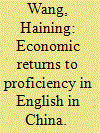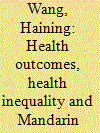| Srl | Item |
| 1 |
ID:
159034


|
|
|
|
|
| Summary/Abstract |
We examine economic returns to proficiency in English in China using two waves of the China Labor-Force Dynamics Survey (CLDS). We find positive earnings returns to proficiency in English. We find considerable heterogeneity in the economic returns to proficiency in English across age groups, coastal and inland provinces, levels of education and occupation. We find that the returns to proficiency in English are higher in the coastal region, higher for women and evidence of education-language and skill-language complementarity. We also see differences in the economic returns to English between urban and rural residents and between rural-urban migrants and urban locals. Our findings help to explain why the demand for learning English is so high in China, as well as having implications for the Chinese government at a time when it is re-evaluating the importance attached to learning English in the curriculum.
|
|
|
|
|
|
|
|
|
|
|
|
|
|
|
|
| 2 |
ID:
168355


|
|
|
|
|
| Summary/Abstract |
We examine the health returns to proficiency in Mandarin in urban China using longitudinal data from the China Family Panel Studies. We find that greater proficiency in Mandarin improves self-reported health, mental health and capacity to perform activities of daily living. We also examine the relationship between Mandarin proficiency and health inequality and the decomposition results show that differences in Mandarin proficiency account for between 2% and 20% of health inequality in urban China, depending on the health indicator. Our results suggest that promoting ‘standard Mandarin’ can serve as a vehicle to improve health outcomes and reduce health inequality.
|
|
|
|
|
|
|
|
|
|
|
|
|
|
|
|
| 3 |
ID:
147619


|
|
|
|
|
| Summary/Abstract |
We examine the relationship between proficiency in Mandarin and consumption in China. We find that proficiency in Mandarin has a positive effect on an individual's total consumption expenditure as well as most categories of consumption expenditure. We also find considerable heterogeneity in the effects of Mandarin proficiency on consumption across subsamples. In addition, we find that proficiency in Mandarin has a positive effect on relative consumption, irrespective of the manner in which the reference group is defined. Our results have important policy implications for debates on the promotion of a national language and, in particular, recent debate about the promotion of speaking Mandarin in China.
|
|
|
|
|
|
|
|
|
|
|
|
|
|
|
|
| 4 |
ID:
187824


|
|
|
|
|
| Summary/Abstract |
We utilise the implementation of the 1999 higher education expansion in China as a natural experiment to examine the relationship between university educational attainment, homeownership and housing wealth. Using data from the 2018 China Family Panel Studies, results from our preferred models, which correct for endogeneity, suggest that having a university qualification generates a 3.5–6.3 percentage points increase in the probability of homeownership and a 24.3–51.1 percentage points increase in total housing wealth. We also find that holding a university qualification increases the number of houses one owns and housing wealth for those whose housing wealth is above the median. We find that self-reported social status and entitlement to superannuation are channels through which higher education affects homeownership and housing wealth and that financial literacy is a channel through which higher education affects housing wealth. We find considerable heterogeneity in the impact of higher education on housing outcomes across gender, family income levels, parent education and between urban and rural areas.
|
|
|
|
|
|
|
|
|
|
|
|
|
|
|
|